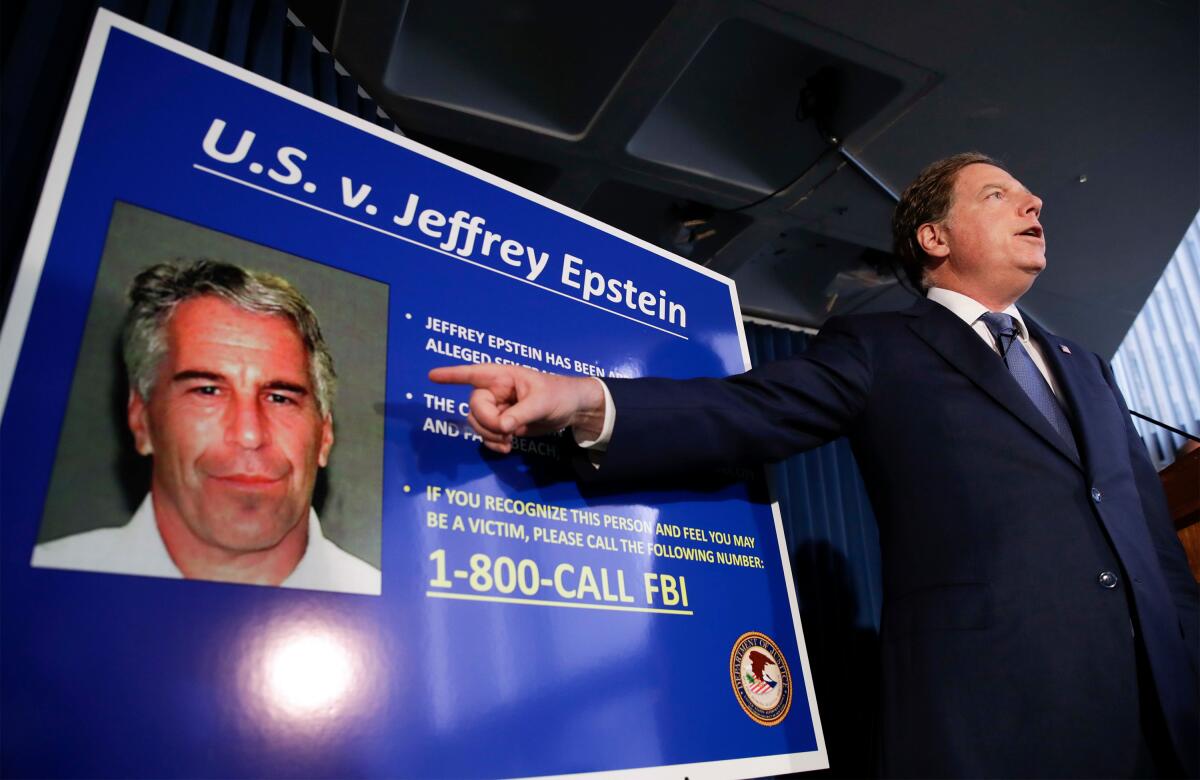Op-Ed: Forget the conspiracy theories. Here’s why it’s likely Jeffrey Epstein killed himself

The safest bet is that Jeffrey Epstein died by suicide.
Given the evidence to date — along with data on suicide among detainees in custody awaiting trial — that’s the most likely conclusion to draw pending a ruling on Epstein’s death from the New York City Office of Chief Medical Examiner.
But that hasn’t stopped a torrent of social media posts offering elaborate theories, suggesting the accused sex trafficker was the target of an orchestrated killing.
Conjecture has run wild, with both #EpsteinMurder and #ClintonBodyCount trending on Twitter. Many tweets begin with a preface assuring the reader “I’m not into conspiracy theories, but ...” And then they offer a conspiracy theory.
One theory places the blame on President Trump and U.S. Atty. Gen. William Barr. It goes like this: Powerful people in control of the DOJ were fearful of what other politically prominent names Epstein might give to prosecutors, and so had Epstein murdered in custody, staging it as a suicide. Purveyors of this theory note that Epstein was being held in a federal facility, which is part of the Department of Justice (run by Barr), and that the Justice department is within the executive branch (run by Donald Trump).
Another equally far-fetched theory substitutes the Clintons for Trump as the shadowy powers who ordered a hit on Epstein. Technically, however, this theory can no longer be dismissed as “fringe,” because it has been ratified by a very official figure: the president.
On Saturday, as speculation ran rampant, Trump retweeted a post from the comedian Terrence Williams, who wrote “Died of SUICIDE on 24/7 SUICIDE WATCH ? Yeah right! How does that happen #JefferyEpstein had information on Bill Clinton & now he’s dead.” Trump’s tweets are official statements of the White House, which means that this fringe theory is no longer “fringe.”
Although the theories implicating Trump and the Clintons are certainly sensational explanations, it’s a far more reasonable guess, given the evidence to date, that Epstein died by suicide. Data support this conclusion.
A DOJ report on mortality in state and federal prisons indicates that at least 222 federal prisoners died by suicide in the years 2001 to 2014, but that number does not offer much in the way of detail about the circumstances of those who killed themselves.
More available — and revealing — are statistics on suicides in state prisons and local jails, where defendants are generally held before trial.
According to a 2015 Bureau of Justice Statistics Report, detainees held in county jails have a higher suicide rate (46 per 100,000 in 2013) than those serving sentences in state prisons (15 per 100,000). The report attributes this higher rate to the “shock of confinement.” Jails are generally where people go immediately after being arrested, and life as they knew it is over. They’ve lost friends, families, jobs, and everything they were familiar with — all things that understandably lead to depression.
Epstein was not held in county jail, but he had quite recently been taken into custody, and he certainly must have experienced confinement shock. One day he was living on his own private island; the next he was in a concrete box.
Although he was convicted on state charges a decade ago, Epstein was awaiting trial on new federal charges in the Southern District of New York, so he was not a convicted prisoner serving a federal sentence. He was instead a pretrial detainee, being held in a federal detention center while awaiting trial. The Bureau of Justice Statistics report noted that suicide rates are even higher for jail detainees who had not yet been tried, like Epstein. Such detainees are seven times more likely to kill themselves than convicted prisoners serving their terms in prison.
According to news reports, Epstein was not on suicide watch when he died, but even if he had been the outcome might have been the same. A study by the U.S. Marshal Service found that about 8% of suicides in correctional facilities occurred even though an inmate was on suicide watch. According to the report, the vast majority of suicides (more than 90%) are hangings, with the second most common being drug overdoses.
Reports suggest that Epstein was having a difficult time adjusting to life in custody. In the end, a medical examiner’s investigation will draw conclusions about whether he took his own life as a result. In the meantime, the rest of us — including the president — should back off the conspiracy theories and wait for the facts to emerge.
Danny Cevallos is an attorney and legal analyst for MSNBC. Follow him on Twitter @CevallosLaw
More to Read
A cure for the common opinion
Get thought-provoking perspectives with our weekly newsletter.
You may occasionally receive promotional content from the Los Angeles Times.






